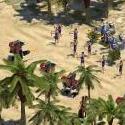Leaderboard
Popular Content
Showing content with the highest reputation on 2018-12-12 in all areas
-
"Man the rational animal the only creature that makes up reasons for what it did after it has done them" Enjoy the Choice3 points
-
3 points
-
I just hope that both teams would have a pacific even a good relantionship. What happens if one of the two teams make an advancement that can benefit both? Just hope that splitting doesn't mean stopping sharing2 points
-
It saddens me when I see splitting of forces, however, since I have been following this project since its beginnings this move was quite inevitable. Nonetheless, as it was already said by @(-_-) the advantages of opensource approach are limitless if you give your soul into it, that is. Moreover, I wish that you guys will bring us a new outlook, additions on RTS genre being it big or small as it was in the past decade which I would be grateful. ( I may visit you sometime to see how things are or if you need some help as well) So I wish you guys fare thee well and luck in your journey and I hope we will hear from you sometime @fatherbushido @mimo and @leper.2 points
-
Greetings! As some of you might have noticed development has nearly come to a halt a while ago. This was not only caused by issues around the initial attempt at releasing Alpha 23, but also regarding how development was done, and a certain number of internal conflicts. A few people were not quite happy with where the development was going, or how the team "interacted" with each other. A long time ago the team at least had each other's backs in cases of conflict. Apparently this ceased to be the case a while ago. You might now wonder why this sad story above is the start of this communication. Well, some of us decided that we were not happy with this, and after each and every one of us stopped considering the current team in this state to be good steersmen we decided to give the whole community an alternative. Please let us introduce you to Fork AD. The amount of changes that have been made to the code since we forked is greater in number than the amount of changes to WFG's SVN repo since May. That may not sound like a lot, until you consider that we've been at this for less than a month, and WFG allegedly has a lot more active members. Now we know you've been craving to know some details of what we've changed so far. Apart from fixing some glaring bugs in the code that were even pointed out to WFG when they were noticed, we are updating a lot of things so we don't place users of our code at risk. There also is a lot better Single Player support, though one could blame that on most of said code effectively being unmaintained, better mod support, improved development tools, a bunch of housekeeping that was needed, and more. If you now ask yourself when and where you can download Fork AD, we still have to defer you to a later point. We will release for all supported platforms, which are still Linux, macOS, Windows, and BSDs, once we are confident that we are releasing something that fullfills your expectations, and is something we can be proud of. Although the progress has already been substantial, we are always open for reinforcement, either from new people or from those disappointed or demotivated by the WFG direction. Artists in particular are very welcomed. As said before, the state of that fork is not yet publicly available, but all information will be given on our website when available. Meanwhile, you can reach us at https://webchat.freenode.net/?channels=forkad Kind regards, fatherbushido, leper and mimo.1 point
-
Today we played an epic winter battle with several base swaps and a lot of sieging. Let's try uploading more of the good games. RamboXXX + Boudica + Cesar vs. bbgotbanned + Unknown_Player + Stockfish 2018-12-11_Winter-Battle.zip1 point
-
I have both of his books and can totally recommend them. So true, but nevertheless we shouldn't stop trying to act morally.1 point
-
Nope, lol, but reading a bit about the concepts he writes about (wikipedia ), I can definitely relate... I should probably give his works a proper read. So, true... There is so much to be said here, I'm not even going to start. The implications for morality in the dystopian future we seem to be heading for are scary. Another Israeli writer, Dan Ariely, actually fundamentally influenced my views on human nature, and our programming and motivations behind our decisions. He's not some great philosopher or anything, bringing him up here might even be a bit silly, and the implications of his writing on morality might not be immediately apparent, but fundamental nonetheless, imo. The modest little book was called Predictably Irrational, and illustrates how nonsensical much of our decision making process is, especially in a modern market. We're not nearly as rational as we like to think. In fact, we are literally predictably irrational, in ways that can be easily manipulated, especially for profit. We're in large part just input/outputs. Cave man logic kind of thing. I think that morality is more of a hind sight thing we use to rationalize our actions. We're not nearly as conscious of our own mind as we like to think, and if we can't even correctly assess our own actions, how could we accurately judge the actions of others? I'd argue that there are indeed moral truths, but I'd be arguing from the perspective of a theist who believes in something absolute. Something perfect. But those things are highly contentious, and from a philosophical perspective, comparing moral truths to mathematical proofs sounds kind of metaphysical. I don't think there have been many other constants in moral truths other than the morals derived from the basic survive and reproduce. In the past, human sacrifice was a common practice, and considered moral. Some cultures even practiced cannibalism, and it was considered moral. Expansionist wars and even genocides have been moralized to various degrees during history. Extreme forms of oppression of women in some parts of the world, or even slavery and caste systems are still unpleasantly common place today. Within those societies those acts are often considered moral. Disregarding the draconian rules of some cast systems is considered so immoral that it will get you publicly lynched. Of course these are extreme examples, like female genital mutilation, most of us can agree that they are a crime against humanity. But what about male circumcision? Some people consider it just as bad as FGM, while other people consider it an integral part of their culture, good for hygiene, a harmless religious commandment... I think examining moral truths is interesting from a philosophical perspective and necessary to continue developing our moral codes, but they're also very difficult to apply universally to the infinite complexity of the human experience. The codes would need to be infinitely complex themselves, to be correct, and it would somehow end up subtracting from our humanity. Man, that druggist is a d*ck... Considering a human life is worth far more than 1000 dollars... Dead people can't pay interest on a loan either... If she dies, he looses a potential life time customer... If the husband steals the drug and gets caught, he should be released under mitigating circumstances.1 point
-
True! I just hope this doesn't split the community or potential contributers to the code. (As in delay the release of new alphas in 0 ad)1 point
-
1 point
-
Although I would agree that this often the case, that is a matter of opinion, and another person would claim that you yourself are in fact misinterpreting the rule. It's like some kind of a weird catch-22. Do you now add rules to interpreting rules? Where does that stop? Everything needs to be evaluated on a case by case basis. The moral code uses human language, not some kind of absolute mathematical algorithm. Language can be pretty abstract, changes over time and place. Laws are supposed to be clear and understandable, but they often become very elaborate and complex to cover all the possible nuances. This in turn makes them more difficult to understand for non-specialists. If somebody doesn't understand the rules, how liable are they really? I would definitely agree that a (strong) moral code is a good thing, but how would it apply to people who can not survive without breaking it? For example homeless people born and raised in cities or countries that passed strong anti-homeless legislation. Man needs to sleep, but you have no place to legally rest your head... I think this is the point. Perfection is a divine quality, that we, mere mortals, are not imbued with. Human nature is primarily geared towards survival, not living up to a moral code. Human nature is also inherently corruptible. Respecting a moral code is a side-effect of society/culture. If the conditions for basic survival aren't met, the moral code flies out the window. Under ideal circumstances, laws might work as intended, but as of now too many people are forced into impossible situations (poverty, war, disease, natural disasters, various forms of persecution and repression). People in those kind of extreme situations, of which there are many, can't be expected to be pre-occupied with not breaking the rules when it's a matter of survival. Rule based society is a necessary evolution in the human condition. Since we don't live in small semi-nomadic family groups anymore, but in a large urbanized world. We need rules to survive as a group, a country, a global society. I just fear that our technological developments have far outpaced our biological evolution, and we simply aren't as physically and mentally adapted to the modern world as we like to think. There are a lot of unexpected and misunderstood side-effects of the modern world, which makes interpreting the rules or anything else we take for granted a lot more difficult. Creating rules implies that you know what is right and what is wrong, but so many things in this world are counter-intuitive. The road to hell is paved with good intentions. Most people believe that their doing the right thing, yet we live in world with a lot of suffering. Quark: "Let me tell you something about hoomans"1 point
-
1 point
-
Assuming the information in the in-game civ structure trees is accurate, the only soldier that does not have 0.6 Food 0.8 Wood 0.5 Stone 0.5 Metal gathering rates are the Skritiai Commandos which I personally am okay with because their combat ability makes up for it. And then also each soldier type has slower rates as they rank up. I did an experiment hoping to show how much the movement speeds affects wood gathering. The results were less drastic than I expected. I created a scenario where you start with a CC, a storehouse next to an oak woodline (28 trees - total 5,600 wood), some houses, 2 soldiers, and enough resources to build 20 additional soldiers. To make it somewhat realistic I created soldiers in batches of 5. I set the gathering point for all to the same initial tree and did not micromanage which trees they cut. I then recorded how long it took for the last soldier to drop the final piece of wood for each unit type (except Skiritai Commandos and Clubmen). I repeated each unit type twice and got the same results. Here they are: Skirmishers (12.6 Walk) - 09:39 Slingers (10.8 Walk) - 09:51 Archers (9.9 Walk) - 10:01 Swordsmen (9.4 Walk) - 10:19 Spearmen (8.5 Walk) - 10:20 Pikeman (7.2 Walk) - 10:53 Women (9 Walk, 0.7 gather rate) - 10:13* I got 10:13 the first time, the next two times were 10:23-ish but the final woman kept walking back and forth and wouldn't go around the women in front of the storehouse. Here is a minute by minute breakdown of how much they gathered. The last number in parentheses for each unit type is the time at which they had deposited all 5,600 wood. Minutes 1min 2min 3min 4min 5min 6min 7min 8min 9min 10min 11min Skirmishers 80 410 1,030 1,800 2,550 3,280 3,970 4,650 5,270 (9:39) ~ Slingers 60 390 980 1,720 2,470 3,190 3,850 4,520 5,140 (9:51) ~ Archers 70 370 970 1,710 2,480 3,180 3,820 4,450 5,060 5,593 (10:01) Swordsmen 60 390 1,000 1,720 2,420 3,100 3,750 4,380 4,970 5,478 (10:19) Spearmen 50 370 940 1,680 2,400 3,070 3,690 4,310 4,900 5,440 (10:20) Pikemen 30 350 910 1,570 2,240 2,900 3,530 4,110 4,680 5,220 (10:53) Women1 110 520 1,210 1,900 2,610 3,280 3,890 4,530 5,100 5,532 (10:13) Women2 110 520 1,210 1,880 2,620 3,260 3,900 4,510 5,080 5,541 (10:23) As expected, it is the case that the faster the walk speed the faster the wood collection. (The women are an exception because they are created faster.) However, much of the difference occurs towards the end of the woodline when more walking is required. So for the first 5 minutes the difference is at most 80w among the ranged units. Pikemen, though, even in the first 5 minutes pikemen are at least 160w behind other melee units. As the game goes on though the effect does become more pronounced. The end times in the data are important as they show how long it takes to catch up. It takes longer to catch up as the game goes on. For example, at minute 1, skirmishers are ahead of slingers by 20, but the slingers actually make up the 20 within 1-2 seconds. Real game factors - Due to path-finding, the workers move in unpredictable ways that can be inefficient. So faster units can randomly under-perform (as can slower units). - These results do not take into consideration soldiers moving from gathering to defend from a rush or to go on a rush and go back to gathering. On the one hand, if defending with archers instead of skirmishers the archers have longer range and would not have to walk as far from the resource to attack the invader. So theoretically they can get back to gathering faster. On the other hand they deal damage slower and may have to fight longer, especially against spear cav. In fact, the enemy rush could force the weak archers to garrison in the CC. It is not obvious to me if archers or skirmishers would get back to wood gathering sooner. Seems like it would depend on the enemy unit composition. I bet defending with slingers would turn out the best. Obviously melee units that have to chase the enemy down while walking slower would lose the most gathering time. If you go on a rush units with faster walk speeds will get back to gather faster. - Also, it is important to keep in mind that the faster you have resources, the faster you can produce more units, the faster you can gather more resources, and so on. This means that in a real game where you are continually producing units the advantage will increase non-linearly if you have faster workers. So you get more workers sooner, and the new workers you get are again faster moving than the opponent's new workers when he gets them. So how big of a deal is it? Does it matter if archers cutting wood for 10 minutes are 22 seconds behind skirmishers cutting wood for 10 minutes? It doesn't seem that bad looking at the data on the chart but it would feel bad if you were trying to build a ram and had to wait 22 seconds for the wood. Entering a battle with a hero or a siege unit can have a big impact on the outcome. And again, because of what's discussed above in real game factors, the advantage/handicap will be more than just 22 seconds worth of gathering. And if for some crazy reason instead of archers you made mostly melee units you'd be worse off yet economically. At the end of all of this I ask: Do we really want a game where you are both economically and militarily incentivized to produce mostly ranged units instead of melee? If archers must be worst of the ranged units economically, shouldn't archers have some other advantage to make them viable?1 point







